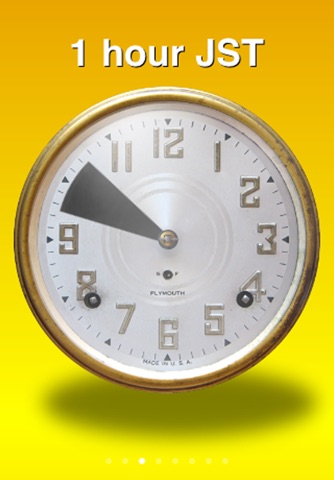
JSTime Clock app for iPhone and iPad
Developer: True Indie Media
First release : 06 Sep 2010
App size: 4.58 Mb
Finally, a clock that tells the time the way we do: in a broad, more general sense. While it goes by many names today (usually “Some-Relaxing-Location Time,” "Some-Cultural-Group Time," or simply “polychromatic time”), the practice of running consistently a few minutes late has roots in ancient tradition. With a sundial’s precision, the JSTime Clock features only an hour hand, eliminating all the fuss about minutes and seconds. This hand is available in several widths, letting you choose a range from 15 minutes to 2 hours, to suit your situation. All this is set against a colorful background which changes to reflect the hour of the day, and the clock alone rotates to stay upright in all orientations.
For example, let’s say you need to meet someone at 5:00 but they’re the sort of person for whom 5:00 can be any time in the 30 minutes after 5:00. Using a traditional clock, you could make yourself crazy as the minute-hand ticks-away the seconds past precisely 5:00. With the JSTime Clock, you choose “30 minute JST” and some part of the wide hour-hand will be on the 5:00 mark any time between 5:00 and 5:30. Arrived at 5:15? Still right on schedule! A wedding invitation says that the ceremony starts at 6:00, but you know that the bride and groom might arrive any time as late 8:00? Set your clock for “2 hour JST” and relax.
Or maybe you typically run on “15 minute JST” but you’re meeting someone – clearly not mishpocha (“family” for those without the Yiddish) – who runs on more precise time, and don’t want to offend. Set the JST Clock for “15 minutes early” to show a hand which begins early and ends at the current precise time, and it will encourage you to meet them on common ground.


